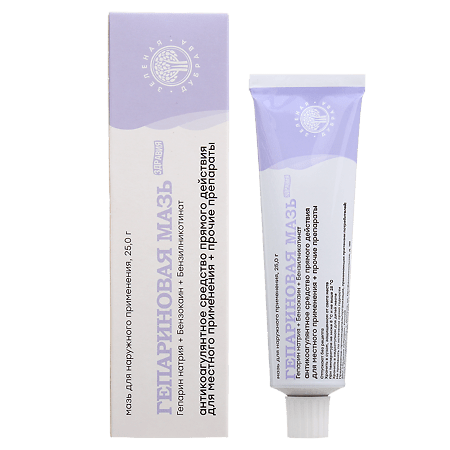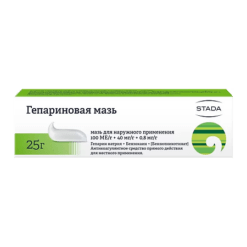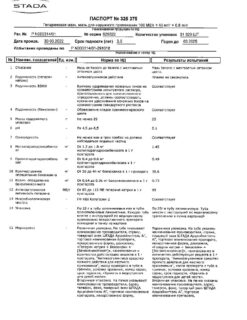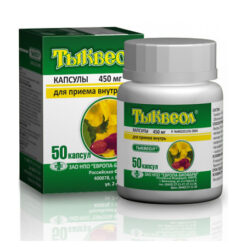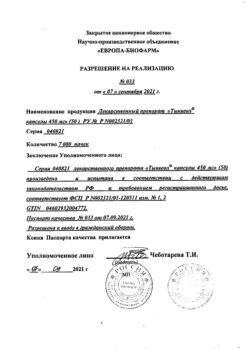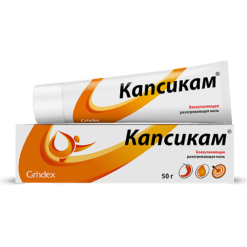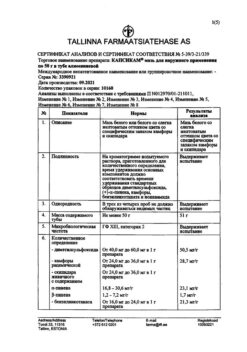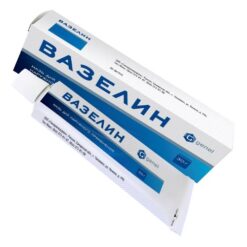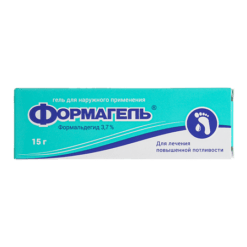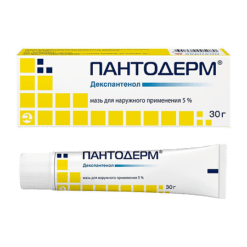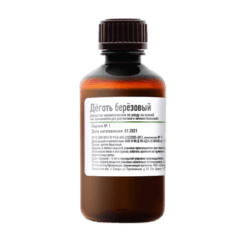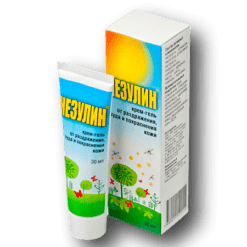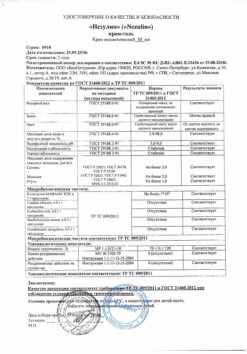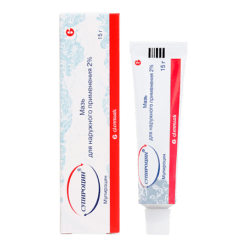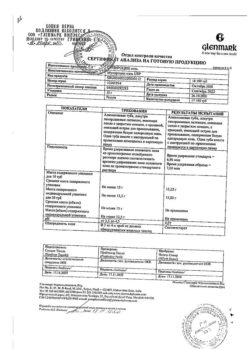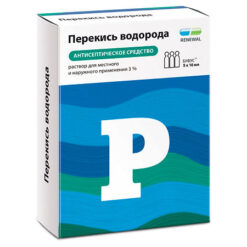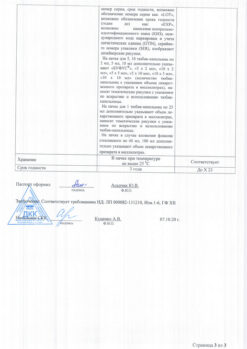No products in the cart.
Heparin ointment, ointment 25 g
€3.86 €3.43
Description
A combination drug for external use, the action of which is due to the properties of its constituent components. It is a direct acting anticoagulant. Sodium heparin gradually released from the ointment reduces inflammation and has an antithrombotic effect. Promotes the resorption of existing clots and prevents the formation of new ones. It blocks the synthesis of thrombin, reduces platelet aggregation. Inhibits the activity of hyaluronidase and activates the fibrinolytic properties of the blood.
Benzylnicotinate has a vasodilator and antispasmodic effect. It directly reduces the contractile activity of the smooth muscles of blood vessels and internal organs. Benzylnicotinate, by dilating surface vessels, promotes absorption of heparin.
The local antiseptic benzocaine (anastesine), reducing the permeability of the cell membrane to sodium ions, blocks the conduction of nerve impulses. It prevents the occurrence of pain impulses in the endings of sensitive nerves and their conduction along the nerve fibers, reduces the severity of pain sensations. When applied to the skin it has a local analgesic effect.
Pharmacokinetics
When applied topically, only a small amount of sodium heparin is absorbed into the systemic circulation and is excreted mainly by the kidneys.
The pharmacokinetics of the active substances benzyl nicotinate and benzocaine (anastesine) have not been studied with local administration.
Indications
Indications
Thrombophlebitis of superficial veins; localized infiltrates and swelling of soft tissues; injuries to tendons and joints, bruises of soft tissues and joints.
Pharmacological effect
Pharmacological effect
A combined preparation for external use, the effect of which is determined by the properties of its constituent components. Direct acting anticoagulant. Sodium heparin, gradually released from the ointment, reduces the inflammatory process and has an antithrombotic effect. Promotes the resorption of existing ones and prevents the formation of new blood clots. Blocks thrombin synthesis, reduces platelet aggregation. Inhibits the activity of hyaluronidase, activates the fibrinolytic properties of the blood.
Benzylnicotinate has a vasodilator and antispasmodic effect. Directly reduces the contractile activity of smooth muscles of blood vessels and internal organs. Benzyl nicotinate, by dilating superficial vessels, promotes the absorption of heparin.
The local antiseptic benzocaine (anasthesin), by reducing the permeability of the cell membrane to sodium ions, blocks the conduction of nerve impulses. Prevents the occurrence of pain impulses at the endings of sensory nerves and their conduction along nerve fibers, reduces the severity of pain. When applied to the skin it has a local analgesic effect.
Pharmacokinetics
When applied topically, only a small amount of sodium heparin is absorbed into the systemic circulation, which is excreted primarily by the kidneys.
The pharmacokinetics of the active ingredients – benzyl nicotinate and benzocaine (anasthesin) – have not been studied when applied topically.
Special instructions
Special instructions
The ointment should not be applied to open wounds, mucous membranes, or if there are purulent processes on the skin. The use of the drug is not recommended for deep venous thrombosis.
With long-term use of heparin, monitoring of blood clotting time is necessary.
With long-term use of benzyl nicotinate, monitoring of liver function and a general blood test is necessary.
Impact on the ability to drive vehicles and machinery
The drug does not affect the ability to drive vehicles or engage in other potentially hazardous activities that require increased concentration and speed of psychomotor reactions.
Active ingredient
Active ingredient
Sodium heparin, Benzocaine, Benzyl nicotinate
Composition
Composition
Active ingredients:
heparin sodium – 10000 IU (0.83 g),
benzocaine (anastezin) – 4.0 g,
benzyl nicotinate – 0.08 g.
Excipients: glycerol – 15.0 g, petroleum jelly – 6.0 g, stearic acid – 5.0 g, corn oil – 5.0 g, emulsifier No. 1 – 8.0 g, methyl parahydroxybenzoate – 0.148 g, propyl parahydroxybenzoate – 0.048 g, purified water – up to 100.0 g.
Pregnancy
Pregnancy
The use of the drug during pregnancy and breastfeeding is possible only according to strict indications under close medical supervision.
The drug is not prescribed in the immediate postpartum period (during the first 3 to 8 days) due to the possibility of increased bleeding as a result of the action of sodium heparin and benzyl nicotinate.
Breastfeeding should be suspended if the use of the drug is necessary during this period (due to the presence of benzocaine (anasthesin) in the composition).
Contraindications
Contraindications
Hypersensitivity to the components of the drug, childhood, ulcerative-necrotic processes in thrombophlebitis, decreased blood clotting, thrombocytopenia, violation of the integrity of the skin (due to the possibility of increased bleeding).
Heparin sodium is contraindicated in hemorrhagic diathesis, leukemia, anemia, increased vascular permeability, polyps, malignant neoplasms and ulcerative lesions of the gastrointestinal tract, severe dysfunction of the liver and kidneys, and operations on the brain and spine.
Benzylnicotinate is contraindicated in paroxysmal tachycardia.
Benzocaine (anasthesin) is contraindicated in case of hypersensitivity to this drug.
With caution
Caution in the use of heparin is required for ulcerative and tumor lesions of the gastrointestinal tract, cachexia, high blood pressure, in the immediate postpartum and postoperative period (during the first 3 to 8 days).
A limitation to the use of benzyl nicotinate is prostate adenoma with impaired urine outflow.
Restrictions on the use of benzocaine (anasthesin) are: breastfeeding (should be suspended), infancy (up to 1 year).
Side Effects
Side Effects
Allergic reactions are possible – skin rash, angioedema. If such symptoms appear, the use of the drug is stopped and desensitizing drugs are prescribed.
When using heparin, the possibility of developing hemorrhages must be taken into account. Along with hemorrhages, the use of heparin can lead to the development of thrombocytopenia, osteoporosis, alopecia and hypoaldosterism.
When using benzyl nicotinate, a transient increase in the activity of liver transaminases, tachycardia, leukopenia, and sometimes impaired renal function are possible.
When using benzocaine (anesthetic), contact dermatitis is occasionally possible; decreased sensitivity at the site of application; rarely, with excessive use – methemoglobinemia (especially in infants and young children).
Interaction
Interaction
The effect of heparin is enhanced by anticoagulation drugs, acetylsalicylic acid and other non-steroidal anti-inflammatory drugs (increases the risk of bleeding), weakened by cardiac glycosides (digitalis drug), tetracyclines, H1 blockers – histamine receptors, nicotinic acid, ethacrynic acid. Benzylnicotinate increases the likelihood of tachyarrhythmias in the presence of sympathomimetics and the risk of cardiac depression under the influence of potassium-removing drugs. Cholinesterase inhibitors inhibit the metabolism of benzocaine (anesthetic).
Overdose
Overdose
Since the drug in therapeutic doses has a predominantly local effect, cases of overdose are unlikely. With prolonged use and on large surfaces, hemorrhagic complications are possible (heparin). In these cases, the use of the drug is stopped and symptomatic therapy is prescribed. Symptoms of overdose of the constituent components when applied topically have not been studied.
Storage conditions
Storage conditions
At a temperature not lower than 8 °C. Keep out of the reach of children.
Shelf life
Shelf life
3 years. Do not use after expiration date.
Manufacturer
Manufacturer
Green Dubrava, Russia
Additional information
| Shelf life | 3 years. Do not use after the expiration date. |
|---|---|
| Conditions of storage | At a temperature not lower than 8 ° C. Keep out of reach of children. |
| Manufacturer | Zelenaya Dubrava, Russia |
| Medication form | topical ointment |
| Brand | Zelenaya Dubrava |
Other forms…
Related products
Buy Heparin ointment, ointment 25 g with delivery to USA, UK, Europe and over 120 other countries.

